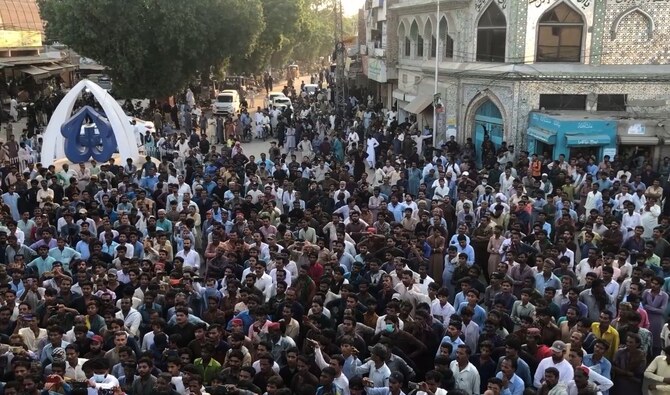KARACHI: Hundreds of civil society activists and residents of Pakistan’s southern Sindh province on Wednesday protested against the killing of a doctor allegedly by police after he was accused of blasphemy, demanding a transparent inquiry into the incident and action against the culprits.
Dr. Shahnawaz Kanbhar, accused of sharing blasphemous content online, was arrested last Wednesday in Umerkot district and killed hours later by police in a purported shootout. According to a report in the Associated Press, police said Dr. Kanbhar was killed unintentionally when police asked two men on a motorcycle to stop but one of them opened fire, prompting them to shoot back. Police said it was only after the shooting that they learned the slain man was the doctor being sought by them for alleged blasphemy.
His family disputes the police account, claiming he was murdered in custody. The incident has sparked widespread condemnation from Pakistani rights activists, who have demanded a transparent investigation.
Accusations of blasphemy — sometimes even just rumors — can spark riots and mob rampages in Pakistan. Although killings of blasphemy suspects by mobs are common, extra-judicial killings by police are rare.
“Today’s protest is purely to arrest the killers of Shahnawaz Kanbhar and punish them,” rights activist Kazwa Nawaz Asif told Arab News during a demonstration attended by hundreds at Umerkot. The protest was held in front of the district’s press club.
Asif said the protest also aimed to prevent such incidents from occurring again in the future.
The Sindh government last week suspended ten officers, including a deputy inspector general of police and registered a case against 34 suspects, out of which 15 were not identified, for burning Dr. Kanbhar’s body.
Suleman Rahimoo, another activist, questioned the government’s decision to conduct an inquiry against a deputy inspector of general police by another officer of the same rank, pointing out that he was his colleague.
“This is why we believe that a judicial inquiry should be carried out,” Rahimoo told Arab News.
Rights activist Sindhu Nawaz said the doctor had pleaded for an opportunity to explain his position, asserting that he was not the one using the account that posted the blasphemous content online.
“But he was killed overnight by the police officials and the body was handed over to fanatics who burnt it,” she said.
Nawaz said Sindh is known as a land where love, peace and interfaith harmony exists.
“To uphold this identity, we felt it was necessary to hold a protest in Umerkot because Umerkot is the land where during Eid, our Hindu brothers congratulate Muslims and when Holi is celebrated, the same Muslims celebrate with them,” she said.
Nawaz vowed that the protest would continue until the officers responsible for killing Dr. Kanbhar are arrested and a judicial inquiry into the matter is conducted.
“This is our Sindh and we will continue to fight to restore this identity,” Nawaz said.
Dr. Kanbhar’s killing marks the second such incident in recent weeks. Earlier this month, a police officer in Balochistan province killed a blasphemy suspect in custody, highlighting the grave dangers faced by persons accused of blasphemy in Pakistan.
Human rights groups and civil society organizations have urged the Pakistani government to repeal the country’s blasphemy laws, which they argue contribute to discrimination and violence. They have also called for a comprehensive review of law enforcers’ response to blasphemy accusations.




















